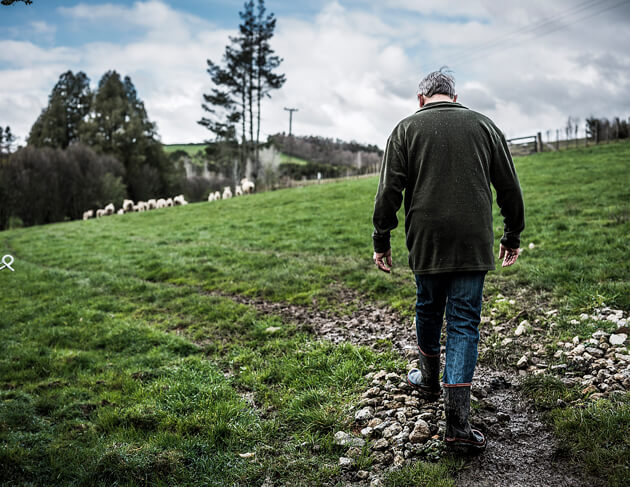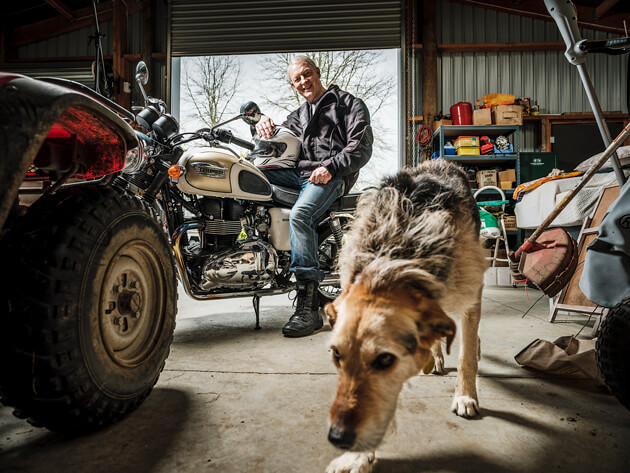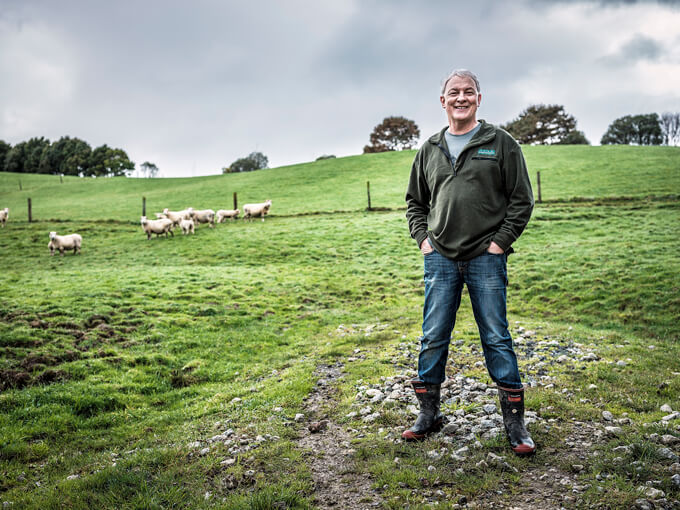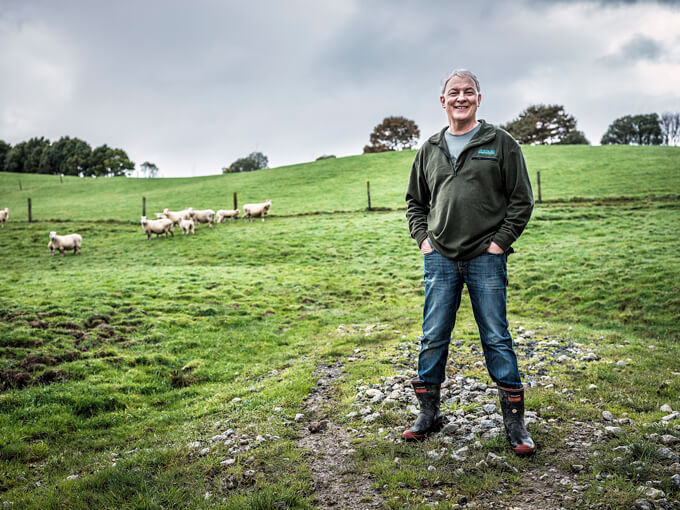Sep 30, 2019 Politics
Phil Goff is in a crowded market, face to face with the man who keeps calling him names on Twitter.
“Hi, Phil,” John Tamihere says, turning his gaze to the middle distance. “Hi,” Goff replies, doing the same. Tamihere is campaigning at the Otara Markets with members of the Pacific Leadership Forum. Goff is there by himself, shaking hands. It’s an unhappy accident that they’ve found themselves walking down the same row of vege stalls. The mayor tries to cut the tension by focusing on the forum’s chairman, Teleiai Edwin Puni. With a glimmer of recognition, he mentions a campaign to build a Te Papa in south Auckland, incorrectly assuming Puni is for the idea. “We’d rather talk to you about our own plans,” Puni says, walking off with Tamihere in tow. Goff later raises the exchange with a local board member. “I thought [Puni] supported Te Papa,” he says, sounding slightly frustrated by the misunderstanding. It’s another vote he’s in danger of losing to his challenger.
Tamihere has made a habit of sidling up alongside special interest groups throughout his campaign to replace Goff as mayor. His message is mostly the same: they’ll get their way under his administration. He launched his campaign in January at Chamberlain Park golf course, where he’s backing a local lobby group in its fight to stop the Albert-Eden Local Board dividing the course to make room for sports fields and parkland. Since then, he’s revealed his support for a Takapuna group devoted to fighting council plans for a town-square development on the site of a public car park.
READ MORE: Why Metro editor Henry Oliver will be voting for Goff?
But it’s not just campaigners Tamihere is targeting. He wants to woo anyone who’s disgruntled at the council. The strategy has been most evident in his freewheeling, semi-unhinged social media presence. He gave the mayor the nickname “Budget Blow Out Phil Goff” on Twitter, and assiduously used it at every possible moment, like a kind of off-brand Donald Trump. His Twitter account has recently been deactivated, though his tweeted polls were his most engaging content to date. One read “Real talk. Let’s poll. @AklCouncil is…” before giving two options: “Arrogant & incompetent” and “Take my money”.
Even if the delivery was amusing, the message was clear: Tamihere is targeting rates hawks and bemoaners of council waste — the types of people who hate cycleways, Lime scooters and light rail. For him, winning the mayoralty means rounding up as many of Auckland’s malcontents as possible and combining their support with that of the voters he can win over in the city’s south and west. In that strategy, Puni and the members of the Pacific Leadership Forum are an outlier. Most disgruntled council critics, whether they’re in Takapuna, Howick, or Mt Albert, lean older, white and conservative.

As a result, Goff has been thrust into an unusual position. His vision of a compact city built around public transport and active transit has won majority support on the council this term. But even before Tamihere came along, there were signs the consensus was starting to fray, as right-wing commentators like Mike Hosking and Leighton Smith churned out complaints about cycleways and increasing numbers of residents associations went into uproar over pedestrian-friendly town-centre upgrades in places like Mt Eden and St Heliers. Despite being a well-to-do Pakeha baby boomer who commutes from Clevedon, Goff has found himself as the only leading mayoral candidate whose policies align with the city’s more youthful set of urbanists and progressives. To stay in office, he may need to achieve the unthinkable: getting young people to vote.
Tamihere is “like Donald Trump trying to restore the Rust Belt”, Goff says. It’s a private conversation but he’s starting to talk like he’s on stage, making a campaign speech. “The answers don’t lie in the past. We are no longer a glorified big town. We are a global city and we need to create the infrastructure that best suits a global city. And by the way, it won’t be new, wider motorways. It won’t be ever-sprawling distant suburbs.”
Goff’s trying to pitch himself as the only sensible home for Auckland’s progressive vote. He highlights Tamihere’s controversial moments, which include describing women as “front bums”, and the questioning by Tamihere and co-host Willie Jackson of a teenage girl who called their radio talkback show about the Roast Busters group. “There are a whole lot of people out there… who will say there’s nothing they find attractive about a Tamihere campaign,” Goff says.
But will progressives vote for a candidate like Goff, who’s often perceived as grey and establishment? The makeup of his campaign team and mayoral office provides a clue to how he plans to take on that pitfall. He’s hired Leroy Beckett, 24, as his campaign manager. Beckett ran several successful campaigns effectively engaging young people in his former role as Auckland director of the youth advocacy group Generation Zero. He’s now tasked with taking on Tamihere’s veteran campaign team, union and political organiser Matt McCarten and National Party stalwart Michelle Boag. Goff’s non-campaign staff also skew young and progressive. Chief of staff Nirupa George, political director Claire Rorke and media manager Will Edmonds are all in their 30s.
READ MORE: On the campaign trail with John Tamihere
None of those staffers would give an interview (Beckett: “It’s just not how we are doing it”) but Goff says he chose the team as a signal he wants to govern for younger people. “I’ve deliberately chosen these people. A, because they’re able and B, because they reflect the needs of coming generations,” he says. “Any young progressive person who’s concerned about environmental issues and social issues, are they going to vote for someone like Tamihere who has a personal track record that is — let me say this as kindly as I can — controversial?”
Back at Otara Markets, Goff is away from Tamihere and trying to win over a different demographic. He’s meeting stall keepers and shoppers, most of them over 50. When Metro went to the same market with Tamihere in April, he could be prickly, occasionally awkward. Goff is more practised, his instincts honed by 40 years in politics. He’ll seize on any hint of eye contact, using the sliver of opportunity to thrust a hand forward and say “gidday”. His go-to opener is a comment on the weather. In an hour and a half, he’ll mention the blustery and changeable conditions upwards of 30 times. Most of the time it works. People seem happy or bemused by the mayor’s aggressive cheer. One tells him he appreciates Goff’s work on rail and housing. “A lot of people don’t get it, but I support you,” one stall owner says. Another offers to give the mayor some manuka honey. Goff declines, but agrees to a compromise and buys it at a discount.
The first hint of a confrontation comes around midday, after Goff makes the 20-minute trip to Howick Village Market. A man accosts him about some delusionary secret council agenda as soon as he gets out of the car. Another more reasonable critic questions plans for light rail down Dominion Rd. He’s worried about car parking. Goff is always careful in these situations, never wanting to give a promise he can’t keep. He tells the truth: Dominion Rd will be a clearway once light rail is in place. People will have to park somewhere else. The man looks nonplussed.
Goff is commonly accused by progressive critics (often on Twitter) of being overcautious, prone to placating opponents instead of just doing what’s right. It’s true to an extent: after winning the mayoralty in 2016, he gave out high-ranking jobs to potential right-wing rivals like Orakei councillor Desley Simpson, and has knocked back projects like the St Heliers town centre upgrade in the face of trenchant opposition. But interactions like the one at Howick show the reality is more nuanced. Even at hostile public meetings, Goff will usually stick to his guns on big issues like moving the port and public transport upgrades. That may cost him at October’s election, but he’s reluctant to compromise to win over disgruntled boomers. “When you have a 38% turnout like we did last election, it’s those that vote that count. But I’m not there to say holding onto power is the most important thing my job revolves around,” he says. “It’s not the most important thing. It’s going out and doing what you believe in and making sure you’re carrying your community with you.”

Even if he wins, the hardest community for Goff to carry with him next term may end up being his own council. For the past three years, he’s achieved most of his agenda with the support of a voting bloc. The loose alliance, snarkily dubbed the “A team” by his council opponents, is united more by shared beliefs about the future shape of Auckland than party affiliation. It relies on support from National Party members, including deputy mayor Bill Cashmore and Waitakere councillor Linda Cooper. “The interesting thing is that when I came onto council, the people who I thought would be the easiest to work with have sometimes been the hardest to work with. And some of the people I thought would be the hardest to work with have been the easiest,” Goff says.
Several of those key allies are going or at risk this election. Penny Hulse is resigning in Waitakere. John Walker will step down in Manurewa-Papakura, likely to be replaced by the conservative candidate Angela Dalton. Progressive councillors Richard Hills and Chris Darby face tough races on the North Shore, Josephine Bartley may struggle in Maungakiekie-Tamaki, and Ross Clow has a battle on his hands in Whau.
Meanwhile, some of Goff’s loudest opponents are making their stands. Veteran councillor Mike Lee surprised his former left-wing allies by running again in Waitemata and Gulf, potentially splitting the left vote with the City Vision-backed candidate Pippa Coom. Goff calls Lee a “curmudgeon” for the sheer volume of his ‘no’ votes in council. “That’s sad,” he says. “I think he used to be better than that.” Lee says the feeling is mutual. He says he tried to advise Goff on Auckland issues early on in his term, and quickly realised the mayor didn’t appreciate his support. “I’d much prefer to work with the mayor instead of against him,” Lee says. “But I have to admit those opportunities have been few and far between and that’s not my fault — it’s his. Phil has decided there’s a group of people he’ll work with and then a group of people he won’t work with. More than that, there’s a group of people he’ll alienate and insult. And I happen to be one of them. He clearly doesn’t want or respect me helping him and he doesn’t respect my role.”
The running theme in all the criticism of Goff is that he’s a lifelong bureaucrat, a “Minister of Auckland” who’s brought an unwelcome style of tribal Wellington politics to local government. Lee: “The problem with Phil is he’s a lifelong parliamentary politician, man and boy. Part of the territory is the in-group and the out-group.” Tamihere: “Goff has been a politician for years. He’s never run a business.” Albert-Eden councillor and Tamihere’s running mate, Christine Fletcher: “He doesn’t understand team-building.”
Manurewa-Papakura councillor Daniel Newman is perhaps most equipped to make the point. He was a Labour Party member in his early 20s, and used to go door knocking with Goff before converting to conservatism. Goff is a skilled Wellington politician who’s unused to making the compromises necessary to steer a council, he says. “At a human level, I like Phil. But in the early interview I had with Phil not long after the election, I told him I didn’t vote for him, not because I didn’t like him but because I thought that his skills weren’t matched to local government.” Newman wants to enforce more consensus-building if the mayor’s allies don’t end up winning a majority next term. “In the event the mayor doesn’t have the numbers for the outcomes that he aspires to, it’s time for Phil Goff to compromise. It’s time for Phil Goff to put aside some of his ideas and conclude that he doesn’t have the numbers to deliver on those things. And that’s not because of politics, it’s because some of his ideas are wrong.”
The road out to Goff’s family farm in Clevedon is long and winding — and blocked by a slow driver in a Toyota Vitz. The mayor is getting antsy. He waits for the car to turn a corner, then floors the pedal in his electric car, leaving the Vitz in his dust. “I hate when people go slow on roads where the speed limit is 100kms,” he says later.
It may clash with his buttoned-up, pro-public-transport public persona, but Goff is a bit of a petrolhead. He has a beloved Triumph motorbike in his garage, and will only ride it kitted out in a full set of leathers. Goff cites the hobby as proof he does have a life outside politics. His love of speed may also be a sign of a secret impatient streak.

The job of mayor is one of frustration. It only guarantees one vote of 21 on council, so any achievements are the result of painstaking negotiation. If Newman, Lee and Fletcher get their wish, Goff’s next term — if he wins one — will be filled with more concessions, placations and deals. Goff’s now 66. After all those years relying on parliamentary majorities, does he have the energy to keep slogging it out with recalcitrant councillors over rule changes and resolutions?
For decades, Goff has leaned heavily on his famous 80-hour-a-week work ethic, but lately he’s had reason to reconsider his work-life balance. Last year, after getting off a plane from Hong Kong and immediately going back to the office, he felt an ache in his left arm. It turned out to be a heart attack, which required a stent. Goff says the attack wasn’t due to stress. “I was pretty lucky,” he says. “My brother died of a heart attack at 58. I’ve never been a smoker. I’m not unfit. So it’s just a family gene thing. I’m used to stress.” But he admits the run-in with mortality did briefly give him cause to reconsider the way he approaches his career.
Goff’s dining room is a testament to a life completely devoted to politics. One wall is occupied by a bookshelf full of political tomes and biographies of world leaders. Sitting in pride of place is Goff’s 500-page master’s thesis, written when he was in his early 20s, titled Labour and the Unions. Up in the paddocks, his sheep are lambing. Goff will go up and check on them, sometimes playing midwife for a birth. On the garage outside the front door, a sign gives the distance to his bach at Orere Point, where he fishes during holidays. And on the wall next to the Labour and the Unions bookshelf, there’s a single photo. It shows Goff and his wife, Mary, on a bench in rural Poland. They’re young — possibly young enough that Goff wasn’t even a full-time politician — and they look happy.
At the moment, Goff isn’t thinking about that other life — the one where he retires, travels, and finishes the memoir he wants to write. “I dunno if it’s my last term,” he says. “Never say die. I kind of always said the day I lack the energy and the enthusiasm for the job, I’m going to give it up.” There’s a case that he should at least start to consider it. The average age of Auckland’s councillors at the moment is over 50. The council has been accused of failing to represent young people, women and minorities, including by Hulse in interviews about her decision to step down. There’s a movement under way to make the council look more like the communities it serves. It’s all very well for Goff to promise to build a city for future generations. But at some point, future generations should get the chance to craft that city for themselves.
This piece originally appeared in the September-October 2019 issue of Metro magazine, with the headline “Phil Goff is in a crowded market, face to face with the man who keeps calling him names on Twitter”.






